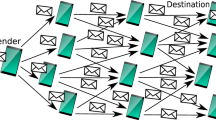Abstract
One of the most challenging applications of wireless networking are in disaster area networks where lack of infrastructure, limited energy resources, need for common operational picture and thereby reliable dissemination are prevalent. In this paper we address anomaly detection in intermittently connected mobile ad hoc networks in which there is little or no knowledge about the actors on the scene, and opportunistic contacts together with a store-and-forward mechanism are used to overcome temporary partitions. The approach uses a statistical method for detecting anomalies when running a manycast protocol for dissemination of important messages to k receivers. Simulation of the random walk gossip (RWG) protocol combined with detection and mitigation mechanisms is used to illustrate that resilience can be built into a network in a fully distributed and attack-agnostic manner, at a modest cost in terms of drop in delivery ratio and additional transmissions. The approach is evaluated with attacks by adversaries that behave in a similar manner to fair nodes when invoking protocol actions.
Access this chapter
Tax calculation will be finalised at checkout
Purchases are for personal use only
Preview
Unable to display preview. Download preview PDF.
Similar content being viewed by others
References
Denning, P.J.: Hastily formed networks. Communications of the ACM 49(4), 15–20 (2006)
Steckler, B., Bradford, B.L., Urrea, S.: Hastily formed networks for complex humanitarian disasters after action report and lessons learned from the naval postgraduate school’s response to hurricane katrina. Technical Report, Naval Postgraduate School (2005)
Asplund, M., Nadjm-Tehrani, S.: A partition-tolerant manycast algorithm for disaster area networks. In: IEEE Symposium on Reliable Distributed Systems, pp. 156–165 (2009)
Aschenbruck, N., Gerhards-Padilla, E., Gerharz, M., Frank, M., Martini, P.: Modelling mobility in disaster area scenarios. In: MSWiM 2007: Proceedings of the 10th ACM Symposium on Modeling, Analysis, and Simulation of Wireless and Mobile Systems, pp. 4–12. ACM, New York (2007)
Ye, N., Chen, Q.: An anomaly detection technique based on a chi-square statistic for detecting intrusions into information systems. Quality and Reliability Engineering International 17(2), 105–112 (2001)
Yang, H., Luo, H., Ye, F., Lu, S., Zhang, L.: Security in mobile ad hoc networks: challenges and solutions. IEEE Wireless Communications 11(1), 38–47 (2004)
Prasithsangaree, P., Krishnamurthy, P.: On a framework for energy-efficient security protocols in wireless networks. Computer Communications 27(17), 1716–1729 (2004)
Farrell, S., Cahill, V.: Security considerations in space and delay tolerant networks. In: Second IEEE International Conference on Space Mission Challenges for Information Technology, Washington, DC, USA, pp. 29–38. IEEE, Los Alamitos (2006)
Liu, Y., Li, Y., Man, H., Jiang, W.: A hybrid data mining anomaly detection technique in ad hoc networks. International Journal of Wireless and Mobile Computing 2(1), 37–46 (2007)
García-Teodoro, P., Díaz-Verdejo, J., Maciá-Fernández, G., Vázquez, E.: Anomaly-based network intrusion detection: Techniques, systems and challenges. Computers & Security 28(1-2), 18–28 (2009)
Nakayama, H., Kurosawa, S., Jamalipour, A., Nemoto, Y., Kato, N.: A dynamic anomaly detection scheme for AODV-based mobile ad hoc networks. IEEE Transactions on Vehicular Technology 58(5), 2471–2481 (2009)
Cabrera, J.B., Gutirrez, C., Mehra, R.K.: Ensemble methods for anomaly detection and distributed intrusion detection in mobile ad-hoc networks. Information Fusion 9(1), 96–119 (2008)
Chuah, M., Yang, P., Han, J.: A ferry-based intrusion detection scheme for sparsely connected ad hoc networks. In: Fourth Annual International Conference on Mobile and Ubiquitous Systems: Networking & Services, pp. 1–8. IEEE, Los Alamitos (2007)
Scalavino, E., Russello, G., Ball, R., Gowadia, V., Lupu, E.C.: An opportunistic authority evaluation scheme for data security in crisis management scenarios. In: ASIACCS 2010: Proceedings of the 5th ACM Symposium on Information, Computer and Communications Security, pp. 157–168. ACM, New York (2010)
Thamilarasu, G., Balasubramanian, A., Mishra, S., Sridhar, R.: A cross-layer based intrusion detection approach for wireless ad hoc networks. In: IEEE International Conference on Mobile Adhoc and Sensor Systems Conference, pp. 854–861. IEEE, Los Alamitos (2005)
Sun, B., Wu, K., Pooch, U.W.: Zone-based intrusion detection for ad hoc networks. International Journal of Ad Hoc & Sensor Wireless Networks. Old City Publishing (2004)
Tseng, C.H., Wang, S.H., Ko, C., Levitt, K.: DEMEM: Distributed evidence-driven message exchange intrusion detection model for MANET. In: Zamboni, D., Krügel, C. (eds.) RAID 2006. LNCS, vol. 4219, pp. 249–271. Springer, Heidelberg (2006)
Huang, Y.a., Lee, W.: A cooperative intrusion detection system for ad hoc networks. In: SASN 2003: Proceedings of the 1st ACM Workshop on Security of Ad Hoc and Sensor Networks, pp. 135–147. ACM, New York (2003)
Deodhar, A., Gujarathi, R.: A cluster based intrusion detection system for mobile ad hoc networks. Technical Report, Virginia Polytechnic Institute & State University
Wang, S.H., Tseng, C.H., Levitt, K., Bishop, M.: Cost-sensitive intrusion responses for mobile ad hoc networks. In: Kruegel, C., Lippmann, R., Clark, A. (eds.) RAID 2007. LNCS, vol. 4637, pp. 127–145. Springer, Heidelberg (2007)
Moore, D.S., Cabe, G.P.M.: Introduction to the practice of statistics, 5th edn. W. H. Freeman, New York (2005)
Author information
Authors and Affiliations
Editor information
Editors and Affiliations
Rights and permissions
Copyright information
© 2010 Springer-Verlag Berlin Heidelberg
About this paper
Cite this paper
Cucurull, J., Asplund, M., Nadjm-Tehrani, S. (2010). Anomaly Detection and Mitigation for Disaster Area Networks. In: Jha, S., Sommer, R., Kreibich, C. (eds) Recent Advances in Intrusion Detection. RAID 2010. Lecture Notes in Computer Science, vol 6307. Springer, Berlin, Heidelberg. https://doi.org/10.1007/978-3-642-15512-3_18
Download citation
DOI: https://doi.org/10.1007/978-3-642-15512-3_18
Publisher Name: Springer, Berlin, Heidelberg
Print ISBN: 978-3-642-15511-6
Online ISBN: 978-3-642-15512-3
eBook Packages: Computer ScienceComputer Science (R0)





